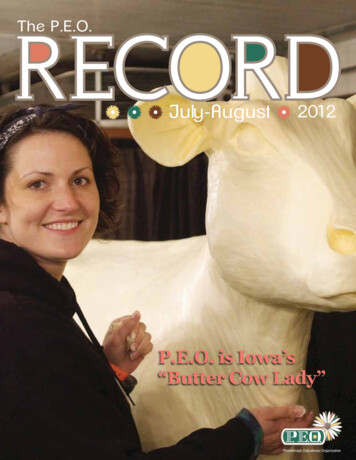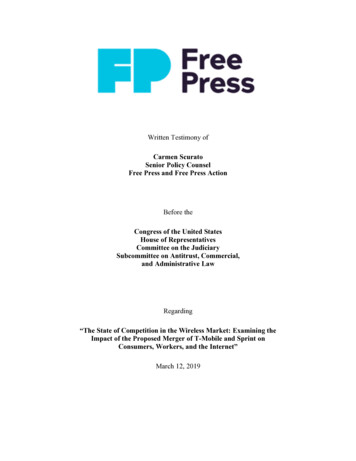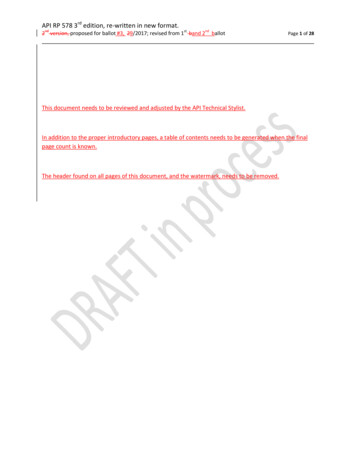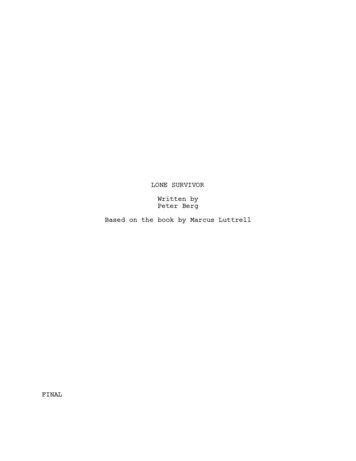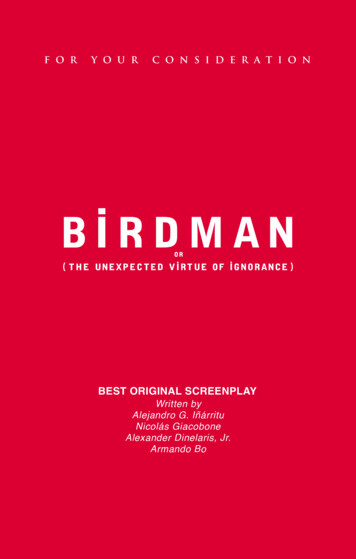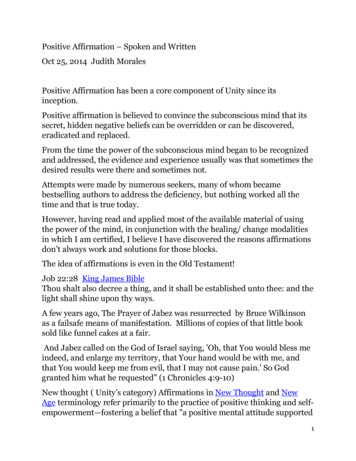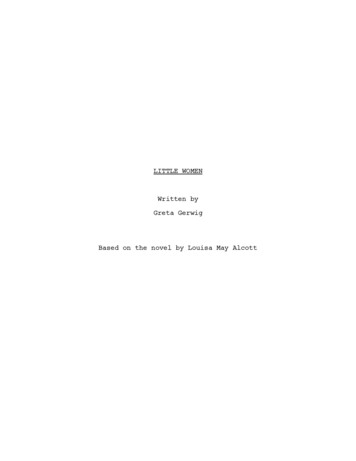
Transcription
LITTLE WOMENWritten byGreta GerwigBased on the novel by Louisa May Alcott
ii.I've had lots of troubles, so I write jolly tales.- Louisa May Alcott
iii.Note:Where there is simultaneous or quick dialogue in the script, thereis a SLASH in the middle of the speaker's dialogue, representingwhere the next actor should begin. The following actor's line willbe started with a SLASH to indicate that it is interruptinganother line.When the text is in RED, it indicates that it is the pasttimeline, which begins in Winter of 1861.When the text is in BLACK, it indicates that it is the presenttimeline, which begins in Fall of 1868.Both timelines move forward from their origin point.
INT. NEW YORK. PUBLISHING OFFICE. 1868.JO MARCH, our heroine, hesitates.In the half-light of a dim hallway, she exhales and prepares,her head bowed like a boxer about to go into the ring. Sheputs her hand on the doorknob. A pause, and then, she opensit onto a disorderly room.It is full of men. Some sit with their feet up on the desks,higher than their hats, which they do not remove for her.They smoke and read, hardly noticing that she has walked in.Jo walks through the desks, looking for one in particular.JO(clearing her throat)Excuse me.MR. DASHWOOD (the oldest, smokiest gentleman) looks at her.JO (CONT'D)I was looking for the WeeklyVolcano office. I wished to seeMr. Dashwood?Mr. Dashwood stares silently.JO (CONT'D)(nervous, presentingpages)A friend of mine desired me tooffer a story, by her, she wrote it- she’d be glad to write more ifthis suits.He stands and extends his rough, large hand. She gives himthe manuscript.MR. DASHWOOD(turning the pages over)Not a first attempt, I take it?JONo, sir; she has sold to “Olympic”and “Scandal” and got a prize for atale in the “Blarney Stone Banner.”A prize?Yes.MR. DASHWOODJO(weakly)
2.He now takes in Jo’s appearance and her mended clothes.Sit.MR. DASHWOODJo sits, hands folded, trying to cover the ink stains. Mr.Dashwood reads her story with a pen in hand, gleefullycrossing out and making notes, changes. Every time his penscratches, Jo feels her heart breaking. She’s on the verge oftears when:MR. DASHWOOD (CONT'D)We’ll take this.JO(looking up)You will?MR. DASHWOODWith alterations. It’s too long.She nods and he hands it back to her, page after page withher work crossed out. She examines it.JOYou’ve cut - I took care to have afew of my sinners repent.MR. DASHWOODThe country just went through awar. People want to be amused, notpreached at. Morals don’t sellnowadays.(pointedly)Perhaps mention that to your“friend.”Jo looks again at her completely altered story.JOWhat do you - that is, whatcompensation MR. DASHWOODWe pay twenty-five to thirty forthings of this sort. We’ll paytwenty for that.JO(money over art)You can have it. Make the edits.Jo hands over the story, Mr. Dashwood hands over the money,business done.
3.JO (CONT'D)(then)Should I tell my, my friend thatyou’ll take another if she had onebetter than this?MR. DASHWOODWe’ll look at it. Tell her to makeit short and spicy. And if the maincharacter’s a girl make sure she’smarried by the end.(casually)Or dead, either way.Excuse me?JOBut he’s on to the next bit of business.MR. DASHWOODWhat name would she like put to thestory?JOOh, yes - none at all if youplease.He considers her.MR. DASHWOODJust as she likes, of course.JOGood morning, sir. Good day.EXT. NEW YORK CITY. DAY. CONTINUOUS. 1868.The streets of New York. After the Civil War and at the brinkof The Industrial Revolution. It is a city in the middle ofbecoming, the 20th century on the horizon. Horses, trolleys,young, old, black, white, immigrants, returning soldiers,factory workers, wealthy industrialists, fashionable womenand poor mothers all crowd the streets.We find Jo (also becoming) sprinting down the street withutter joy. She has pulled up her skirts and is running fullsteam. Not lady-running, flat-out RUNNING. For the joy of it.LITTLE WOMEN
4.EXT./INT. BOARDING HOUSE. NYC. DAY. 1868.Jo reading and walking at the same time, bounding two-at-atime up the steps of a large brownstone boarding house. Shestoops to pick up a cat who suns herself on the steps.JO(to the cat)My Beth would like you very much.As Jo walks through the house, into the drawing room, shelets the cat down, and goes straight to the fireplace. Shestands with her back to it, to warm herself, and produces asmall notebook and begins to write.She is so engrossed with her writing that she doesn’t hearthe boisterous group of college students and professors, menand a few women, when they descend upon the room. She justkeeps writing, until:FRIEDRICH (O.S.)Good afternoon, Miss March.Jo looks up from her notebook to see FRIEDRICH BHAER lookingdown at her. He speaks with a French accent, and, like allEuropeans, seems to know something that we Americans don’t:JO(she straightens up)Good afternoon, Professor.FRIEDRICHYou’re on fire.Thank you.JOFRIEDRICH(suddenly animated)You’re on fire!Jo suddenly notices that the back of her dress has caught onfire. In a panic, another woman of the group helps her andthe dress is put out.Disaster is avoided, although not humiliation.FRIEDRICH(laughing)I have the same habit, you see?
5.He shows her scorch marks on his jacket. Jo is about to laughwhen, MRS. KIRKE, the landlady, bustles into the room:MRS. KIRKEKitty and Minny are waiting!Jo looks up the stairs to see the two little girls prancing.JOMy students need me.FRIEDRICHAlways working.JO(joke-dramatically)Money is the end and aim of mymercenary existence.FRIEDRICHNo one gets ink stains like yoursjust out of a desire for money.Jo feels the intense pleasure and pain of being seen bysomeone, of knowing that they know you.JO(embarrassed, retreating)Well my sister Amy is in Paris, anduntil she marries someone obscenelywealthy, it’s up to me to keep thefamily afloat. Goodbye.FRIEDRICH(staring up after her)Goodbye.EXT. FRANCE. PARIS. DAY. 1868.AMY MARCH, an angelic 20-year-old with golden curls, ispainting a staged scene, along with a few other youngartists. It is a classic scene of two young men and a youngwoman at a picnic, and Amy is rendering it realistically,imitating the 18th & 19th century painters she loved.She looks at the painting of the young man next to her. He isdoing something radically different - the paint is obvious,the colors are bright and un-life-like, space is flattened.It is not meant to be realistic: it is the beginning ofmodernism.She looks back at her own piece and realizes that she mighthave missed the moment that she came here to master.
6.Perhaps she’s already passed before her time. She continuesworking, troubled.EXT. PARIS PROMENADE. DAY. 1868.Amy rides in an open air carriage with AUNT MARCH, reading aletter from home. Everyone in Paris is out. Aunt March isonly happy when she’s complaining, and she’s in excellentform this morning. It is the place to see and be seen and AmyMarch is doing both excellently.AUNT MARCHThe decadents have ruined Paris, ifyou ask me. These French womencouldn’t lift a hairbrush.No response from Amy.AUNT MARCH (CONT'D)AMY! I said, “These French womencouldn’t lift a hairbrush.”AMYOh yes! Very true, Aunt March.AUNT MARCHDon’t humor me, girl. What do theywrite, your troublemaking family?AMYMother doesn’t say anything aboutBeth. I feel I should go back butthey all say “stay.”AUNT MARCHYou can do nothing if you go back.The girl is sick, not lonely.Amy gives her a hard look.AUNT MARCH (CONT'D)And you shouldn’t go home until youand Fred Vaughn are properlyengaged.Amy blushes and puts the letter away.AMYYes, and until I’ve completed allof my painting lessons, of course.Aunt March looks at her, momentarily confused.
7.AUNT MARCHWhat? Oh, yes, yes. Of course.Amy looks at all the passers-by. She sees a somber young man,tall and dark and looking down as he walks. Suddenly!AMYSTOP THE CARRIAGE! LAURIE! LAURIE!Abandoning her primness, she launches out of the carriage andruns, nearly knocking people over. This is Theodore Laurence,LAURIE, a 26-year-old without a sense of direction, like most26-year-olds. They hug joyously and un-self-consciously:LAURIEAMY! You’re so /grown up!AMY/You wrote you’d come to thehotel!LAURIEI looked for you and couldn’tfind /you anywhere!AMY/You didn’t look hard enough!LAURIEMaybe I just didn’t recognizeyou, you’ve become sobeaut/iful.AMY(making a face)/Please don’t.LAURIEI thought you liked that sort ofthing!AMYNO. Where’s your Grandfather?LAURIEStill in Germany. I’m on myown, traveling and /havingfun.AMY(teasing him)/and drinking and gamblingand flirting.LAURIEDon’t tell your mother!AMYAre you chasing some young girlacross Europe?No.LAURIE(darkening)
8.AMY(dropping her playfulness)I’m. I couldn’t believe Jo turnedyou down. I’m so sorry.LAURIE(crisp)Don’t be, Amy. I’m not.AUNT MARCH (O.S.)AMY! AMY MARCH! YOU COME BACK HERERIGHT THIS INSTANT!AMY(to Laurie)Oh, Aunt March!Laurie gallops over, and jumps into the carriage, kissingher:LAURIEAren’t we fine, /Ma’am.AUNT MARCH/GET HIM OFF OF ME!He kisses her again, grinning.AUNT MARCHIl faut GO! Allons-y!Aunt March attempts to get the carriage to leave, and Laurieis thrown off while Amy is thrown in.AMY(calling after Laurie)Come to the New Year’s Party! It’sa ball and everyone will be there,including Fred - Pick me up at thehotel at eight - the Chavain! Dressfor festivities! Top hats andsilks!LAURIEI will! I’ll wear my best silk!Laurie turns and continues his heartbroken stroll, as Amylooks at him. She turns back to Aunt March.AMYIt’s Laurie!I know.AUNT MARCHAmy turns around to get one last look at Laurie. She loveshim, as she’s always loved him.
9.INT. TAILOR SHOP. AFTERNOON. 1868.MEG MARCH, beautiful but with the melancholy of yearningemanating from her, is browsing the silks with Sallie Moffat,a rich young woman who possesses an air of casual boredomthat comes from never having to work for what you have.SALLIE(to the clerk)Twenty yards of the blue silk aswell as the pink. Someone will beby for it later.She looks over at Meg, who touches a beautiful grey silk:SALLIE (CONT'D)Oh Meg! That would look so lovelyon you. I know just the dressmakerto send you to. You’ll be theprettiest wife in Concord.MEGOh no, John needs a new coat forwinter and Daisy and Demi need newclothes and -SALLIE-- and his wife needs a new dress.MEG(trying to hide herembarrassment)I can’t. it’s, I just can’t.SALLIEHe’ll be so pleased with how youlook that he’ll forget all aboutthe expense.MEG(equivocating)I don’t suppose it’s such anextravagance.SALES CLERKWill twenty yards do?MEG(deciding)Yes. Thank you.And Meg watches, delighted but fighting guilt, as thebeautiful fabric is cut.
10.EXT. MEG MARCH’S HOUSE. DAY. 1868.From inside a modest rural cottage, Meg emerges, wiping herhands and muttering to herself.MEG(ashamed)Fifty dollars, what was I thinking?She sees her two 3-year-olds, a boy and a girl, DAISY andDEMI, playing in the yard. She sits down to watch them,feeling both grateful and trapped. They run up to her.DAISY AND DEMIMommy -- mommy!They fall into her arms, she accepts them and then sends themoff to play again. We hear sounds a beautiful Bach pianosonata being played.EXT. / INT. MARCH HOUSE. 1868. the music grows louder as we see empty rooms of thechildhood home -- the attic, the dining room, the stairs.Finally we find BETH MARCH, alone at the piano. She stopsplaying suddenly, as if in pain. Then she takes a deepbreath, feels the sunlight on her hand, and stretches it out.MARMEE (O.S.)Beth! Beth?She doesn’t respond.INT. NEW YORK THEATRE. EVENING. 1868.Shakespeare’s Twelfth Night unfolds on stage. Jo is in theback, the cheap standing-room. She’s so wrapped up that shemoves in until she’s practically leaning over the railing.It’s the scene where Viola (dressed as a man) seduces Olivia.OLIVIA.That you do think you are notwhat you are.VIOLAThen think you right, I am not whatI am!Friedrich watches the play from his own, proper, seat. At acertain point, he sees Jo, and then watches her watching theplay, her delight making him smile.
11.INT. NEW YORK THEATRE LOBBY. NIGHT. 1868.The audience flows out of the theatre into the lobby. Jo,still in her theatrical reverie, spots Friedrich. Shefreezes, not moving, not wanting to be seen.She then follows behind the band of friends, drawn to them inspite of herself.INT. GERMAN BEER HALL. NIGHT. 1868.It is a rowdy and raucous crowd, drinking and dancing. Jowalks through the crowd, taking it in, watching Friedrich. Heknows everyone and can speak half a dozen languages. Anotherman young, speaking a language Jo doesn’t know, offers hishand for the dance.JOI’m sorry, I only speak English.YOUNG MANCome dance!He pulls her into the dance, and she does her best to followalong. It’s whirling and loud and wild. Before long, shefinds herself paired with Friedrich and all selfconsciousness leaves her. She is part of the night and theroom and the music and she throws herself into movement, andwe are taken back to.THE PAST. INT. CONCORD. MARCH HOUSE. JO & MEG’S ROOM. 1861.the sisters, all together again in the past, in the snowglobe of girlhood and memory that is ever present but forevergone, are in a flurry of getting ready for a holiday party.MEGI know just who I’ll dance with!AMYWho will you dance with, Jo?JOYou know I never dance.BETHI can’t dance.AMYWhy can’t we all go to the party?!It’s not fair!Meg’s hair is covered in papers, and Jo manipulates a pair ofhot tongs. Meg struggles to get on a pair of slippers.
12.JOJust wear your regular/shoes.MEG(forcing it)/These fit last winter!Amy puts on jewels and rouge and tries to shape her nose.AMYMy nose will simply not lookrefined.BETH(to no-one)I like your nose.AMY(reaching to Jo)Now, Jo -JO-- don’t touch me, thanks! Ialready feel ridiculous I don’twant to look it!AMYYou could be pretty if you tried.JODon’t want to, won’t do it.BETHI don’t want to go but I wish Icould hear all the music.JOI’ll keep it all in my head and tryto sing it for you w
INT. NEW YORK. PUBLISHING OFFICE. 1868. JO MARCH, our heroine, hesitates. In the half-light of a dim hallway, she exhales and prepares, her head bowed like a boxer about to go into the ring.
